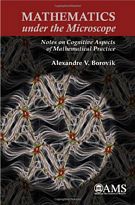
|
FreeComputerBooks.com
Links to Free Computer, Mathematics, Technical Books all over the World
|
|
- Title: Mathematics under the Microscope: Notes on Cognitive Aspects of Mathematical Practice
- Author(s) Alexandre V. Borovik
- Publisher: American Mathematical Society (December 31, 2009); eBook (2008)
- Hardcover: 317 pages
- eBook: PDF (326 pages, 12.7 MB)
- Language: English
- ISBN-10/ASIN: 0821847619
- ISBN-13: 978-0821847619
- Share This:

|
The author's goal is to start a dialogue between mathematicians and cognitive scientists. He discusses, from a working mathematician's point of view, the mystery of mathematical intuition: why are certain mathematical concepts more intuitive than others? To what extent does the "small scale" structure of mathematical concepts and algorithms reflect the workings of the human brain? What are the "elementary particles" of mathematics that build up the mathematical universe?
The book is saturated with amusing examples from a wide range of disciplines - from turbulence to error-correcting codes to logic - as well as with just puzzles and brainteasers. Despite the very serious subject matter, the author's approach is lighthearted and entertaining.
This is an unusual and unusually fascinating book. Readers who never thought about mathematics after their school years will be amazed to discover how many habits of mind, ideas, and even material objects that are inherently mathematical serve as building blocks of our civilization and everyday life.
About the Authors- Alexandre V. Borovik is a Professor of Pure Mathematics at the University of Manchester, United Kingdom.
- Popular, Recreational, and Miscellaneous Mathematics
- Discrete Mathematics
- Mathematical Logic - Set Theory, Model Theory, Computability, etc
-
 A Mathematician's Apology (G. H. Hardy)
A Mathematician's Apology (G. H. Hardy)
This book is the famous essay by British mathematician G. H. Hardy. It concerns the aesthetics of mathematics with some personal content, and gives the layman an insight into the mind of a working mathematician.
-
 Math Alive (Ingrid Daubechies, et at)
Math Alive (Ingrid Daubechies, et at)
Mathematics has profoundly changed our world, from banking to listening to music. This course is designed for those who haven't had college mathematics but would like to understand some of the mathematical concepts behind important modern applications.
-
 A Gentle Introduction to the Art of Mathematics (Joseph Fields)
A Gentle Introduction to the Art of Mathematics (Joseph Fields)
The purpose of this book is to acclimatize the student to some of the culture and terminology of mathematics and to begin developing in them a proficiency at reading and writing mathematical proofs.
-
 Mathematical Surprises (Mordechai Ben-Ari)
Mathematical Surprises (Mordechai Ben-Ari)
This is open access book provides plenty of pleasant mathematical surprises. There are many fascinating results that do not appear in textbooks although they are accessible with a good knowledge of secondary-school mathematics.
-
 Explaining Logarithms (Dan Umbarger)
Explaining Logarithms (Dan Umbarger)
This book shows the evolution of logarithmic ideas over 350 years. The author do believes that a quick review of mathematics as it was practiced for hundreds of years would be helpful for many students in understanding logarithms as they are still used today.
-
 Mathematical Omnibus: Thirty Lectures on Classic Mathematics
Mathematical Omnibus: Thirty Lectures on Classic Mathematics
This is an enjoyable book with suggested uses ranging from a text for a undergraduate Honors Mathematics Seminar to a coffee table book. The common thread in the selected subjects is their illustration of the unity and beauty of mathematics.
-
 Street-Fighting Math: Guessing & Opportunistic Problem Solving
Street-Fighting Math: Guessing & Opportunistic Problem Solving
This engaging book is an antidote to the rigor mortis brought on by too much mathematical rigor, teaching us how to guess answers without needing a proof or an exact calculation.
-
 What is Mathematics: Godel's Theorem and Around (K. Podnieks)
What is Mathematics: Godel's Theorem and Around (K. Podnieks)
This accessible book gives a new, detailed and elementary explanation of the Godel incompleteness theorems and presents the Chaitin results and their relation to the da Costa-Doria results, which are given in full, but with no technicalities.
-
 Mathematics in the Age of the Turing Machine (Thomas C. Hales)
Mathematics in the Age of the Turing Machine (Thomas C. Hales)
Computers have rapidly become so pervasive in mathematics that future generations may look back to this day as a golden dawn. The article gives a survey of mathematical proofs that rely on computer calculations and formal proofs.





